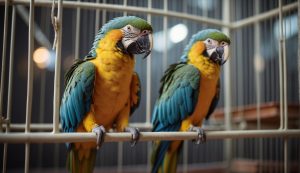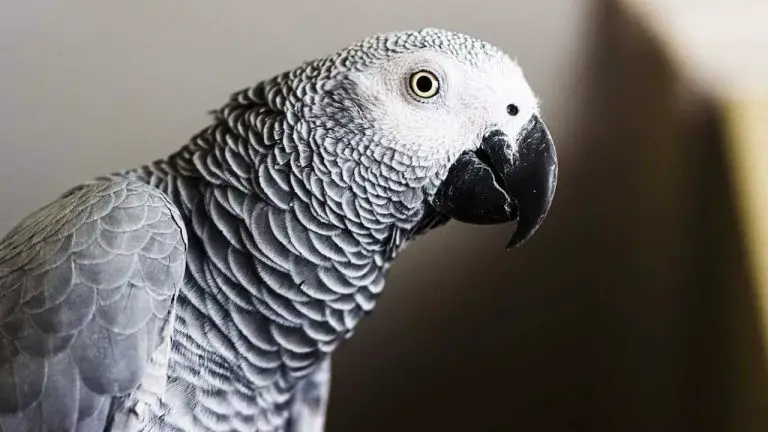Do Budgies Need to Be in Pairs for Optimal Health and Happiness?

Many people wonder whether budgies need to be kept in pairs or if they can live happily on their own. The answer to this question is not a straightforward one and depends on a variety of factors.
Budgies are social birds that enjoy the company of other budgies. In the wild, they live in flocks and form strong social bonds with other birds. However, this does not necessarily mean that they need to be kept in pairs in captivity. Budgies can also form strong bonds with their human owners and can live happy and fulfilling lives as a single bird.
It is important to consider the individual needs and personality of your budgie when deciding whether to keep them in pairs or alone. Some budgies may be perfectly content living on their own, while others may become lonely and depressed without the company of another bird. Ultimately, the decision should be based on what is best for your bird’s well-being.
Table of Contents
Natural Behavior of Budgies
Budgies, also known as parakeets, are social birds that are native to Australia. They are known for their playful and curious nature, and they thrive in the company of other birds. In the wild, budgies live in large flocks and spend most of their day foraging for food, grooming each other, and engaging in social activities.
When kept in captivity, budgies still exhibit their natural social behavior. They are highly social birds and need regular interaction with their owners or other birds to stay happy and healthy. Budgies that are kept alone for extended periods of time can become bored, depressed, and even develop behavioral problems such as feather plucking.
However, it is important to note that not all budgies need to be kept in pairs. Some budgies are perfectly content living alone as long as they receive enough attention and socialization from their owners. It is important to observe your budgie’s behavior and personality to determine whether they would benefit from having a companion.
When introducing a new budgie to your existing bird, it is important to do so gradually and under supervision. Budgies can be territorial and may need time to adjust to a new bird in their space. Providing separate cages and gradually increasing their time together can help ensure a successful introduction.
Budgies are social birds that thrive in the company of other birds. While not all budgies need to be kept in pairs, it is important to provide regular socialization and attention to keep them happy and healthy. When introducing a new bird, it is important to do so gradually and under supervision to ensure a successful introduction.
Benefits of Keeping Budgies in Pairs
Keeping a pair of budgies can be highly beneficial for both the birds and their owners. Here are some of the benefits:
- Companionship: Budgies are social birds and keeping them in pairs provides them with a companion. This helps to reduce stress and anxiety in the birds, as they have someone to interact with and play with.
- Less Boredom: Budgies in pairs are less likely to become bored and develop bad habits, such as feather plucking or excessive screaming. They have each other to keep entertained and can engage in natural behaviors such as preening and playing.
- Health Benefits: Budgies in pairs tend to be healthier as they have a partner to groom and preen them, which helps to keep their feathers in good condition. They also have more opportunities to exercise and play, which can help prevent obesity and other health issues.
- Breeding Opportunities: If you are interested in breeding budgies, keeping a pair is essential. Budgies are monogamous birds and need a partner to breed with. Having a pair also provides a natural environment for raising chicks.
Overall, keeping budgies in pairs can be highly rewarding for both the birds and their owners. It provides the birds with companionship, reduces boredom, promotes good health, and provides breeding opportunities. If you are considering getting a budgie, it is recommended to get a pair to ensure their well-being and happiness.
Possible Issues with Keeping Budgies Alone
While it is possible to keep a single budgie, there are some potential issues that may arise if they are not kept in pairs or groups:
- Lack of social interaction: Budgies are highly social birds and require regular interaction with their own kind to remain happy and healthy. Without a companion, a budgie may become bored, lonely, and may even develop behavioral issues such as feather plucking or excessive screaming.
- Boredom: Budgies are intelligent birds that require mental stimulation to thrive. A single budgie may become bored and may resort to destructive behaviors such as chewing on furniture or other household items.
- Depression: Budgies are known to experience depression when kept alone for extended periods of time. Signs of depression may include lethargy, lack of appetite, and a general disinterest in their surroundings.
- Shorter lifespan: Studies have shown that budgies kept in pairs or groups tend to live longer than those kept alone. This may be due to the increased social interaction and mental stimulation that comes with living with other birds.
Overall, while it is possible to keep a single budgie, it is important to consider the potential issues that may arise. If you are unable to provide your budgie with regular social interaction and mental stimulation, it may be best to consider getting a companion for them.
Factors to Consider when Keeping Budgies in Pairs
Gender
When it comes to keeping budgies in pairs, gender is an important factor to consider. Male and female budgies have different personalities and behaviors that can affect their compatibility with each other. In general, male budgies tend to be more vocal and outgoing, while female budgies are typically more reserved and quieter. It’s important to note that same-sex pairs can also be compatible, but it’s important to observe their behavior and ensure they are getting along well.
Age
The age of the budgies is another important factor to consider when keeping them in pairs. It’s best to pair birds that are around the same age, as larger age differences can lead to dominance issues and potential fighting. Additionally, younger budgies tend to be more adaptable and easier to introduce to a new partner than older birds.
Compatibility
Compatibility between budgies is crucial when keeping them in pairs. It’s important to observe their behavior and ensure they are getting along well. Signs of compatibility include preening each other, sharing food and water, and sleeping close together. If you notice any signs of aggression, such as biting or chasing, it’s important to separate the birds and try introducing them again at a later time.
Overall, keeping budgies in pairs can be a great way to provide them with companionship and mental stimulation. However, it’s important to consider the factors mentioned above to ensure a successful pairing.
Can You Put an Old Budgie with a New One?
If you already have a budgie and are considering getting another one, you may be wondering if it’s possible to introduce an old budgie to a new one. The answer is yes, but it’s important to do it carefully and slowly to avoid any potential conflicts.
One thing to keep in mind is that budgies are social birds and prefer to be in pairs or small groups. Introducing a new budgie to an older one can provide companionship and prevent loneliness, which can lead to depression and other health problems.
When introducing a new budgie to an older one, it’s important to do it gradually. Start by placing the cages near each other so they can see and hear each other. After a few days, you can let them out of their cages to explore each other’s space while supervised.
If they seem to be getting along, you can try putting them in the same cage. However, it’s important to make sure the cage is large enough to accommodate both birds comfortably and has multiple food and water dishes to prevent any squabbles over resources.
Keep in mind that not all budgies will get along, and it’s possible that they may never be able to share a cage. If this is the case, it’s important to provide separate cages and ensure that each bird gets enough social interaction and stimulation.
Conclusion
After considering all the factors, it is clear that budgies do not necessarily need to be kept in pairs. While they are social birds and enjoy the company of other budgies, they can also thrive as a single pet with plenty of human interaction and stimulation.
It is important to note that if you do choose to keep multiple budgies, you must provide adequate space, food, and attention for each bird. Additionally, introducing new birds to an established flock can be a delicate process and should be done with caution.
Ultimately, the decision to keep one or more budgies should be based on your lifestyle and ability to provide for their needs. Whether you choose to keep a single budgie or a flock, proper care and attention will ensure a happy and healthy pet.











